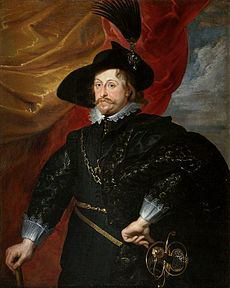

Grand Duke of Lithuania
9 June 1595 Łobzów, Polish–Lithuanian Commonwealth
20 May 1648(1648-05-20) (52) Merkinė, Polish–Lithuanian Commonwealth
NamesCasimir Andrew Jagiellon
King of Poland, Grand Duke of Lithuania and titular King of Sweden, who ruled from 1632 to 1648 This article is about the 17th-century Polish king. For another person called Władysław IV of Poland, see Władysław I the Elbow-High. King of Poland Władysław IV Vasa or Ladislaus IV of Poland (9 June 1595 – 20 May 1648) was King of Poland, Grand Duke of Lithuania and claimant of the thrones of Sweden and Russia, who ruled from 1632 until his death in 1648. Władysław IV was the eldest son of Sigismund III Vasa and his wife, Anna of Austria. Born into the House of Vasa, Władysław was elected Tsar of Russia by the Seven Boyars in 1610 when the Polish army captured Moscow, but did not assume the throne due to his father's position and a popular uprising. Nevertheless, until 1634 he used the titular title of Grand Duke of Muscovy, a principality centered around Moscow. Elected king of Poland in 1632, he was largely successful in defending the Polish–Lithuanian Commonwealth against foreign invasion, most notably in the Smolensk War of 1632–34, in which he participated personally. He supported religious tolerance and carried out military reforms, such as the founding of the Commonwealth Navy. Władysław was also a renowned patron of the arts and music. He failed, however, at reclaiming the Swedish throne, gaining fame by defeating the Ottoman Empire, strengthening royal power, and reforming the Commonwealth's political system. Despite these failures, his personal charisma and popularity among all segments of society contributed to relative internal calm in the Commonwealth. He died without a legitimate son and was succeeded to the Polish throne by his half-brother, John II Casimir Vasa. Władysław's death marked the end of relative stability in the Polish–Lithuanian Commonwealth, as conflicts and tensions that had been growing over several decades came to a head with devastating consequences. The Khmelnytsky Uprising in the east (1648) and the subsequent Swedish invasion ("the Deluge", 1655–60) weakened the country and diminished Poland's status as a regional power. For this reason, Władysław's reign was seen in following decades as a bygone golden era of stability and prosperity.

We use cookies
We use cookies and other tracking technologies to improve your browsing experience on our website, to show you personalized content and targeted ads, to analyze our website traffic, and to understand where our visitors are coming from. Privacy Policy.